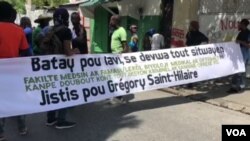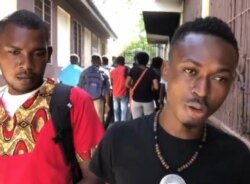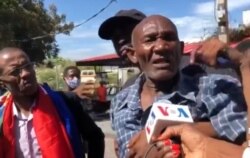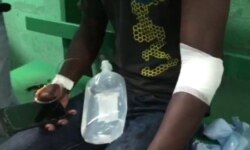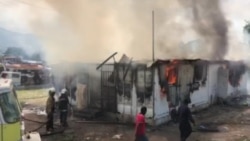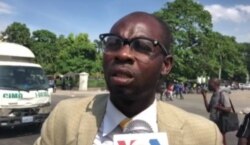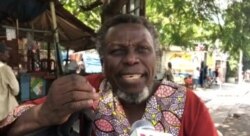Haitian University students protested Friday in the streets of Port-au-Prince, expressing rage over the killing of fellow student Gregory Saint-Hillaire, 29, who was allegedly killed Oct. 2 by police on university grounds while demanding the teaching job he was promised after graduating.
The protesters said they wanted revenge and justice, as they chanted a song harkening back to the time of the slave revolution to gain independence from France.
“We're not protesting because we believe we will get justice," Oldenson Saint Pierre, a medical student at the State University, told VOA Creole. "We're out here because we know this government only responds to violence. They only understand burning tires, damage to cars, so if that is what they understand, we are ready to use those means to make sure our message is heard.”
Saint Pierre described victim Saint-Hilaire as an honest man who was fighting for a just cause. He said they were simply asking the National Police director general to identify the officer who allegedly shot Saint-Hilaire, arrest him and bring him to justice.
Friday was the fifth day of student protests this month, during which they have set fire to cars, vandalized buildings and blocked roads. Their tactics are similar to those successfully used in September by the rebel national police protesters, who call themselves Fantom 509, to force officials to grant their demands to release fellow officers who were “unjustly imprisoned” in their view.
Eyewitness account of Gregory Saint-Hilaire's killing
Gregory Saint-Hillaire lived in the Village de Dieu (Village of God) slum of the Haitian capital, notorious for gang violence. He graduated in 2018 from the Ecole Normale Superieure, a state university a stone's throw from the national palace, where he majored in social sciences, and then went on to study law at the state university.
According to eyewitness Jean Ronald Olicier, who was with Saint-Hilaire at the time of his death, they were at the school on the afternoon of Oct. 2, discussing job placement with university officials. The national ministry of education signed an agreement with the Ecole Normale Superieure offering internships and teaching jobs to graduates. That didn't happen, angering students, who accused them of playing politics. Saint-Hilaire should have gotten a job last year, Olicier said.
"So it's during our fight [with school officials] to get him a job that the USPGN [Unite de Securite Generale du Palais National] police arrived and fired tear gas at us," Olicier said.
The specialized police unit protects the president and is under his command.
"Another group of agents were waiting for us at the gate," he told VOA. "While we were exiting, they shot Gregory in the back. After the bullet hit his spine, they kept shooting and firing tear gas, preventing us from taking him to the hospital."
The eyewitness told VOA the injured and bleeding Saint-Hilaire spent nearly three hours inside the school without receiving medical care. Finally, they decided to put him on a table and took him to the general hospital.
"When we got there, we couldn't find a doctor, but luckily a journalist from Radio Quisqueya offered to put Gregory in his car and took us to the Bernard Mevs hospital. When we got to Bernard Mevs, he died," Olicier said.
Saint-Hilaire's parents were inconsolable after learning of their son's death. His mother told VOA she'd made sacrifices and struggled to make sure her son had a good life and promising future. She made him lunch every day and took it to the school.
"I have not heard from any law enforcement officials. They have treated my son like a John Doe," his father told VOA, alleging "this was a planned attack. We want reparations, justice."
President Jovenel Moise commented on the student's death in a tweet on Oct. 4.
"The death of student Gregory Saint-Hilaire sparks indignation in all of us. I reaffirm my faith in the right of every citizen to life. My sympathies and regrets to the family. An investigation is under way to shed light on this death which is one too many," Moise said.
Haiti's national police force has been dogged for years by accusations of corruption and human rights violations. The PNH inspector general has vowed to investigate the crime and bring those responsible for the student’s death to justice.
Tear gas, shots and fires
A short time after the protest began Friday, police used tear gas to disperse the protesters, sending them running for cover. A medical student who was heading home from the state university after class told VOA Creole he was shot in the elbow as police targeted protesters marching through the Turgeau neighborhood. He said he sought medical assistance at the university hospital and that after being shot he saw a protester shot in the head.
"The students are fighting for a just cause and look at what happened. I was not part of the protest, but I'm a victim anyway," he said. "They are not just fighting for themselves, they are fighting for all of us."
Some protesters, angered by police aggression, retaliated by setting fire to a nearby courthouse, according to two witnesses.
"All of a sudden, rocks started landing inside the courthouse," Frankel, a lawyer who was participating in a trial, told VOA. "When we looked outside, we saw a group of young men, with face masks on so we could not identify them, throwing rocks at us." The trial continued, the lawyer said, until the building was set on fire and everyone ran out, including the person on trial.
"We were unable to save any documents," he said, adding that security guards were on duty.
"We shouldn't have to pay for things we are not responsible for," he said, pointing to the endangerment of innocent bystanders' lives. "What outraged people inside the courthouse even more is that the police didn't even respond to calls for help."
Lawyer James Turaine, who also witnessed the courthouse attack, said he understood what motivated the protesters.
"We can understand these frustrations, and it's not just the students, the entire country is sick and tired of this situation," he said. "As a lawyer I believe the government has an obligation to make things better on all levels."
University professor and activist Josue Merilien, who joined the protesters, noted the importance of the event.
"I think this is a legitimate movement. This movement is important to the entire nation. This has never happened in history. This is the first time a student has been killed by law enforcement inside a school. This is what angers us," he told VOA.




